|
|
|
Sort Order |
|
|
|
Items / Page
|
|
|
|
|
|
|
| Srl | Item |
| 1 |
ID:
099189


|
|
|
| 2 |
ID:
117045
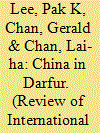

|
|
|
|
|
| Publication |
2012.
|
| Summary/Abstract |
Most people hold that in its quest for natural resources abroad, China shields rogue states with egregious human-rights record from international opprobrium and sanctions. Its political support for Sudan is a case in point. By examining Chinese perspectives on humanitarian intervention and national sovereignty, this article first argues that Beijing's interests are so multiple and complex that concern about the implications of humanitarian intervention for national integration is more crucial than oil in determining its policy towards Sudan. Paradoxically it asserts that China, a non-democratic country, is more influential than liberal democratic states in making the rules of humanitarian intervention in Darfur because of a lack of political will in the West. In addition, there are early signs that China intends to utilise its newfound power to remake international rules regarding territorial sovereignty. Further development is likely to be shaped by its interactions with the United States.
|
|
|
|
|
|
|
|
|
|
|
|
|
|
|
|
| 3 |
ID:
166752
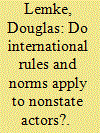

|
|
|
|
|
| Summary/Abstract |
The nonstate actors of interest in this article are territorial contenders: political entities that control populated territory, function like sovereign states but are not recognized as sovereign states by other members of the international system. Sometimes they are de facto states, sometimes they are rebel groups, sometimes they are neither of these, instead existing in control of territory with neither conflict against the sovereign state within whose borders they exist nor claims to a state of their own. New data about territorial contenders permit me to evaluate arguments about changing rules and norms in the international system. I find support for claims about the consequences of changing rules about which actors are recognized as sovereign states but not for claims about a norm against conquest after World War II. In the discussion section, I consider implications of these findings for future research.
|
|
|
|
|
|
|
|
|
|
|
|
|
|
|
|
| 4 |
ID:
133839
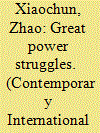

|
|
|
|
|
| Publication |
2014.
|
| Summary/Abstract |
International order is the norm, standards and corresponding guaranteeing mechanism, decision making process, and rule of procedures established by members of the international system to coordinate and deal with various international affairs, in order to maintain stability and the normal operation in the international system. As an international public product, international order is usually supported by the major actors of the international system.
|
|
|
|
|
|
|
|
|
|
|
|
|
|
|
|
| 5 |
ID:
185098
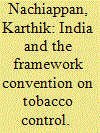

|
|
|
|
|
| Summary/Abstract |
This paper investigates why India actively negotiated and ratified the Framework Convention on Tobacco Control (FCTC), the first global health treaty to curb tobacco use worldwide. The World Health Organization’s (WHO) decision to conduct FCTC negotiations aligned with India’s shifting disease burden that was pivoting from infectious to non-communicable diseases, particularly cancer, which shot up due to surging tobacco use. The WHO’s decision to frame the agreement around constraining global tobacco commerce, particularly the might of multinational tobacco companies, meshed with the interests of New Delhi, which was concurrently seeking to curb surging tobacco consumption. This triggered a positive approach and attitude to FCTC negotiations, leading to India’s ratification. India’s negotiation and ratification of the FCTC shows that the literature(s) on rising powers and international organizations must consider how factors like the WHO’s institutional politics, specifically the intent to negotiate a focused global agreement to curb tobacco production and distribution worldwide, affects how countries perceive and seek to use that agreement to bolster domestic policy concerns like tobacco control.
|
|
|
|
|
|
|
|
|
|
|
|
|
|
|
|
| 6 |
ID:
112421
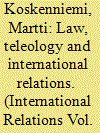

|
|
|
|
|
| Publication |
2012.
|
| Summary/Abstract |
Interdisciplinary approaches often bemoan international law's lack of theoretical sophistication and naïve utopianism. Instead of offering effective tools of governance, it seems committed to outdated ideas about an international public realm and a dubious teleology of progress. This essay - given as the E. H. Carr lecture at the University of Aberystwyth in 2011 - reviews efforts to reform international law into a science and a more efficient instrument of international rule. Such efforts have been a part of international law's internal development but their lack of success depends on a mistaken view of the field as a 'discipline' - a set of theoretical or technical propositions. This essay defends a view of international law as an argumentative practice in which political claims are defended and attacked, rather than as a governance tool or institutional blueprint. At its worst, law may buttress bureaucratic privilege. At its best it may offer, for a cynical world, a vocabulary for imagining better futures. It may also sharpen political thought and strategic awareness, but it cannot replace them.
|
|
|
|
|
|
|
|
|
|
|
|
|
|
|
|
| 7 |
ID:
133655
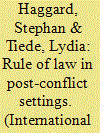

|
|
|
|
|
| Publication |
2014.
|
| Summary/Abstract |
This paper analyzes whether and to what extent countries reconstitute the rule of law following civil conflict. Drawing on an original data set of 47 cases in which conflict ended between 1970 and 1999, we find that the cessation of conflict has at best a modest effect on the rule of law. On average, countries revert to the pre-conflict rule-of-law status quo ante. In simple models, rule of law prior to the onset of conflict is the best indicator of post-conflict performance. Analysis of individual cases using structural break analysis shows that the cessation of conflict is not typically associated with an inflection in the rule of law; improvements are modest, take a long time, and fall far short of plausible thresholds for robust rule of law.
|
|
|
|
|
|
|
|
|
|
|
|
|
|
|
|
| 8 |
ID:
122999
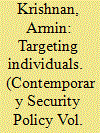

|
|
|
|
|
| Publication |
2013.
|
| Summary/Abstract |
Targeted killing is not new. What has changed is the nature of armed conflict, states that openly admit to the practice, and the emergence of much more capable technology. Targeting individuals seems to make sense given the changing nature of armed conflict. But whether targeting dangerous individuals is indeed legal, effective, and ethical is often impossible to determine, either in specific cases or systematically, because of the secrecy surrounding such operations. Calls from civil society and legislatures for greater transparency in targeted killings are unlikely to result in more openness or accountability, easily denied by the precedence of security claims for these intelligence-driven operations and covert actions. This barrier also makes it very difficult to develop consistent domestic and international rules for targeting individuals outside war zones. If states became more transparent about how and why individuals are targeted, the approach could gain more legitimacy. Rather than giving states a blanket legal authority of secretly killing individuals they deem terrorists or threats to national security, a workable solution could be a systematic preference to rely on non-lethal means in targeted counterterrorism operations with the aim of subsequent prosecution of captured individuals. A systematic preference for non-lethality should be accompanied by a requirement for the humane treatment of detained terrorists/combatants and a requirement for a fair trial after a specified period of detention. Secret prisons and indefinite detentions of terrorism suspects not charged with any crime should not be permissible practices in democratic states.
|
|
|
|
|
|
|
|
|
|
|
|
|
|
|
|
|
|
|
|
|